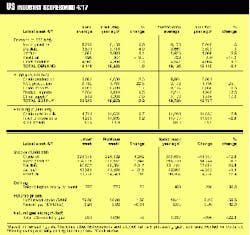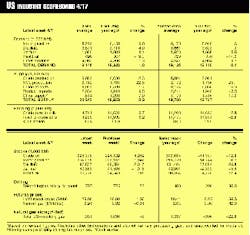OGJ Newsletter
At first glance, OPEC's recent decision to hike output in order to rein oil prices seems to be taking hold on markets (OGJ, Apr. 3, 2000, p. 26).
Brent fell to a 3-month low Apr. 10 to $21.30/bbl, down $1.28 from Apr. 7. OPEC's basket price fell as well, closing at $20.99/bbl Apr. 10 vs. $22.24/bbl Apr. 7. Both markers have plunged more than $7/bbl in the past month.
However, IEA says oil markets are likely to remain tight despite OPEC's commitment to boost its production. IEA says more crude will be needed to meet market demand and keep prices at current levels. The agency expects global demand in 2000 to average 76.7 million b/d, up about 2.1% from 1999. OPEC is set to review its oil production decision in June.
The IEA report helped put a little bounce back in oil prices. NYMEX crude for May rose 29¢ to finish Apr. 11 at $24.14/bbl and then continued its climb Apr. 12, soaring $1.24 to close at $25.41/bbl.
The recent slide in oil prices hasn't stopped some in the US Congress from offering belated sops to US consumers still irked over high fuel prices.
Two legislative measures aimed at giving US consumers a break from high fuel prices have reached opposite conclusions.
The House has passed a bill to establish a home heating oil reserve in the Northeast US. The Senate already had approved a similar bill. The reserve could be used in case of an energy supply disruption, a severe price increase, or extreme cold. Rep. Joe Barton (R-Tex.) added an amendment to require DOE to buy stripper oil at $15/bbl if prices drop below that level.
Meanwhile, the Senate has spurned an effort by Majority Leader Trent Lott (R-Miss.) to roll back 4.3¢/gal of the 18.4¢ federal gasoline tax to ease the burden higher fuel prices are placing on US consumers. Lott said Americans need relief from higher gasoline prices; opponents said such a small amount wouldn't make any difference, but the funding loss would undercut highway construction. The 4.3¢ was added in 1993. The Senate voted 56-43 against a procedural motion that would have allowed a direct vote on the bill.
The US Federal Trade Commission has given preliminary approval to BP Amoco's $30 billion acquisition of ARCO.
The five commissioners approved the deal on the condition that some undisclosed but minor objections can be resolved. FTC had blocked the merger in February, forcing BP Amoco to sell ARCO assets in Alaska to Phillips Petroleum and pipeline assets serving the Cushing, Okla., hub to Texas Eastern Products Co. (OGJ, Mar. 27, 2000, pp. 32, 33).
Meanwhile, press reports have surfaced that ExxonMobil last week was negotiating to drop a lawsuit that seeks to halt the ARCO-Phillips deal, clearing a path for the BP Amoco-ARCO merger (OGJ, Apr. 3, 2000, p. 30).
The movement toward the virtual oil company continues to gain momentum as more and more companies announce e-commerce, business-to-business, and outsourcing alliances (OGJ, Feb. 7, 2000, Newsletter).
A joint venture of 14 major international energy and petrochemical firms are to launch an internet-based independent industry procurement exchange that would shave costs from their combined $125 billion/year spent in procurement transactions. Initially, say the founders, the exchange will include "all procurement activities related to goods and services used within the oil and gas exploration and production business and the petrochemicals, refining, marketing, and retail sectors of the industry."
The partners will create an independent entity to own and run the exchange, which is expected to be on line by the third quarter, and an IPO is planned. The founding firms-which will hold 75% equity in the new company-are Shell, BP Amoco, Conoco, Dow Chemicals, Equilon Enterprises, Mitsubishi, Motiva Enterprises, Oxy Petroleum, Phillips, Repsol-YPF, Statoil, Tosco, TotalFinaElf, and Unocal.
Shell International E&P and Halliburton are to form a 50-50 joint venture, WellDynamics, to develop and market the two companies' intelligent well and completions technologies. "The true long-term value of this technology will be achieved only with development of complete systems-integrating Shell operator and Halliburton service company capabilities and technologies. We believe that its impact in the industry will be as great as 3D seismic and horizontal well technology," said Phil Watts, managing director and CEO of E&P for Royal Dutch/Shell.
With offices in Aberdeen, WellDynamics will combine Shell's iWell and Halliburton's SmartWell operations in what officials describe as a convergence of state-of-the-art downhole measurement, inflow control, downhole processing, and communications technology. The new JV will be headed by Larry Kinch, founder and chairman of Petroleum Engineering Services, recently acquired by Halliburton. Its initial staff will be recruited from PES, Halliburton, and Shell.
Meanwhile, McMoRan Exploration and Halliburton have formed an alliance in which the service firm will conduct operations of McMoRan's Gulf of Mexico E&D program. The proposed partnership follows the independent's recent gulf acquisitions: one from Texaco to explore 89 tracts (OGJ, Jan. 3, 2000, Newsletter) and a second from Shell Offshore for interests in 56 exploratory leases. Between the two deals, McMoRan gained exploratory rights to 160 blocks covering about 750,000 gross acres.
Executives from 10 international oil firms are to visit Saudi Arabia this month to hold preliminary talks on energy investments in the kingdom, says Middle East Economic Survey. Companies invited to meet with the new Supreme Council for Petroleum and Mineral Affairs include BP Amoco, Chevron, Conoco, ENI, ExxonMobil, Marathon, Phillips, Shell, Texaco, and TotalFinaElf.
As expected, the US Export-Import Bank board has approved $498 million in loan guarantees for Russia's Tyumen Oil (TNK), so that it can purchase equipment from US firms to rehabilitate a refinery and an oil field (OGJ, Apr. 10, 2000, p. 38). Ex-Im Bank Chairman James Harmon said, "Ex-Im Bank is serious about providing support for creditworthy transactions to keep US exporters competitive and maintain a level playing field for them in Russia." Simon Kukes, TNK president and CEO, said, "The Export-Import Bank board decision represents a significant vote of confidence in our company."
TotalFinaElf and the UK's Ramco Energy have started talks to collaborate on a $1.2 billion project to develop Azerbaijan's most productive offshore deposit, in the shallow-water section of Gunesh* field, said Patrick Lantigner, TotalFinaElf's E&P manager in Baku. The firms are conducting technical talks with state oil firm SOCAR. Previously, Ramco and Conoco had drawn up a preliminary production-sharing agreement for the field, but Conoco pulled out of talks last summer. Lantigner said he expects negotiations for the Ramco-TotalFinaElf PSA to begin within a few months.
The project will be an unusual one in that SOCAR-usually not prone to assuming operatorship in projects involving foreign partners-seeks to remain operator of the developed sections of the field, leaving the undeveloped portions to be operated by either Ramco or TotalFinaElf, or both together. Baku is reluctant to give up control of the oil field-which accounts for a bit more than 60% of SOCAR's total output of 180,000 b/d-yet it needs foreign investment and technology to curb a production decline dating to 1992. SOCAR hopes to boost output from the field by employing horizontal drilling methods or gas or water injection, or a combination of these methods.
The proposed natural gas pipeline from Papua New Guinea to Queensland received a boost this week with word that Comalco Ltd. has chosen Gladstone as the preferred site for its $1.4 billion (Aus.) alumina refinery (OGJ, Dec. 14, 1998, Newsletter). Comalco says it is committed to use Papua New Guinea gas for electricity generation at the plant, if the pipeline is completed in time and a feasibility study confirms viability of the plant itself. The study is to take several months, and a final board decision about the project will be sought by the end of September. The refinery is to come on stream in 2003.
Comalco has ruled out an alternative location in Malaysia, but it has flagged the possibility of joining up with what it calls `strategic partners' to develop the refinery. Comalco is 72% owned by Rio Tinto Ltd. and could bring in partners at any stage during the plant's proposed 30-year life. A factor in the decision to opt for Gladstone is a combined $250 million (Aus.) in financial support promised by the Queensland and federal governments. The Chevron group planning the gas pipeline welcomed the decision, saying it is a major milestone that goes a long way toward sustaining impetus for the project.

